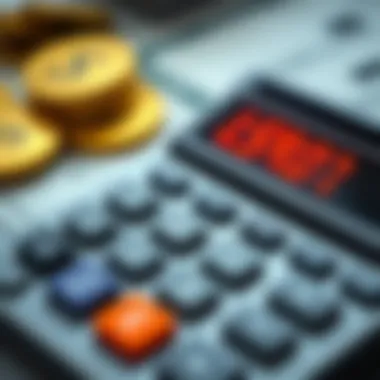Converting 160,000 USD to AED: A Comprehensive Guide


Intro
Understanding the conversion of currency, especially when dealing with large sums like 160,000 USD, can feel like navigating a maze. With the economic landscape forever shifting, the questions of "How much is that in AED?" and "What factors influence the conversion rate?" loom large. In Dubai's fast-paced real estate market, these conversions carry weight beyond mere numbers. They can shape investment strategies, influence purchasing power, and ultimately affect the financial choices of numerous expatriates and investors alike.
This article will unpack the complexities of converting USD to AED while focusing on 160,000 USD as a practical example. We'll tap into the current state of market trends, dive deep into the impact on property investment, and offer advice that might just help you make your next big move. Buckle up as we unravel the threads of currency conversion and its implications in the sphere of Dubai's vibrant real estate scene.
Market Trends
Current Market Analysis
When we think about the exchange rates, especially in relation to AED, it’s like catching a moving target. As of late 2023, the exchange rate hovers around 3.67 AED per USD, but it can swing wildly based on various external factors like economic reports, geopolitical tensions, and shifts in oil prices. On average, when converting 160,000 USD, investors can expect around 588,000 AED, barring any unexpected fluctuations.
Take a look at the local dynamics. Dubai has seen an influx of new expatriates drawn in by work opportunities, lifestyle, and a burgeoning real estate market. The appetite for property, particularly in prime locations like Downtown Dubai and Dubai Marina, is fierce. This demand can influence exchange rates as higher levels of investments push the local economy.
Future Predictions
Looking forward, predictions indicate that the AED may hold steady against the USD due to the UAE's robust economic policies and its oil-backed economy. However, fluctuations could occur based on international trade agreements and global events. Investors eying property purchases should keep their ears to the ground. Floating exchange rates can lead to potential savings—or losses—dependent on timing.
"The foreign exchange market is much like the ocean; its tides are influenced by both natural events and human actions, creating waves of opportunity for those who understand its currents."
Property Investment Insights
Types of Investment Properties
Dubai's real estate market is as diverse as it is dynamic. For those converting funds from USD to AED, knowing the types of properties available can shape investment decisions. Investors often lean towards:
- Residential units: Apartment buildings and villas
- Commercial space: Office buildings and retail outlets
- Mixed-use developments: Combining residential, commercial, and retail elements under one roof
Each type has its own set of benefits and potential return on investment, making it crucial to align your financial strategy with market demands and trends.
Financing Options and Tips
Navigating the financing waters can be tricky. Local banks offer various mortgage options, often requiring a down payment of around 20-25% of the property value. Some popular banks in Dubai include Emirates NBD and ADCB, which provide competitive rates for expatriates.
Investors should also consider setting up a local bank account to facilitate currency conversions and manage transactions efficiently. Here are a few tips:
- Research different banks: Services vary significantly, so compare rates and terms.
- Consult with a financial advisor: They can provide personalized advice tailored to your situation.
- Stay updated on regulations: Real estate laws fluctuate frequently, and being knowledgeable can save you time and money.
By understanding both market trends and property investment insights, investors can maximize their resources and make informed choices, enhancing their engagement with Dubai's real estate opportunities.
Prelims to Currency Conversion
In today's globalized world, the ability to convert currency effectively has become increasingly crucial for investors, expatriates, and travelers alike. The ease of moving between different currencies, particularly in financial hubs like Dubai, plays a significant role in personal and business transactions. This section aims to dissect the concept of currency conversion and the specific nuances involved in converting 160,000 USD to AED.
One must understand that currency exchange is not merely a straightforward matter of changing money from one form to another. Understanding Currency Exchange involves grasping broader economic implications, exchange rate fluctuations, and the factors influencing these variables. Further, knowing how to navigate this complex system can yield substantial benefits, especially when large sums like 160,000 USD are in play.
Accuracy in currency conversion can drastically impact how financial decisions are made. A minor mistake in understanding or calculating conversions can lead to significant losses, especially in the fast-paced market environment. This article seeks to emphasize the Importance of Accurate Conversion. By ensuring one comprehends the tools and methods available, the reader can sidestep potential pitfalls and make informed decisions, be it for investing in real estate or managing a budget while living abroad.
As the economic landscape continually shifts, the need for precise currency pair analysis persists. With this knowledge, individuals can assess their own financial landscapes, from local investment opportunities to even basic budgeting during travels. The currency conversion mechanism, thus, stands as an essential element of navigating financial endeavors, particularly for investors and expatriates seeking leverage in vibrant markets.
"An informed investor is a powerful investor. Understanding currency conversion can be a game-changer in your financial journey, particularly in a global economy."
This foundation will serve to enlighten readers about the subsequent sections, detailing current rates, the various factors influencing exchange rates, and ultimately providing a thorough walkthrough of converting 160,000 USD to AED with clarity and precision.
Current Exchange Rate Overview
Understanding the Current Exchange Rate Overview is pivotal for grasping how currency conversion works, particularly when dealing with significant figures like 160,000 USD. Knowing the rates helps potential investors and expatriates plot their financial journeys in unfamiliar waters. Exchange rates are the ever-shifting figures that tell us how much one currency is worth when compared to another. This is crucial not just for immediate travel plans or one-off purchases, but for strategic investments and long-term financial planning.
With active fluctuations in currency values, following the current rates can provide timely insights for making or breaking investment decisions. For instance, a sudden dip in the AED value against the USD could present a golden opportunity for those looking to invest large sums, such as 160,000 USD, into the UAE market. Conversely, changes in rates can also have adverse impacts, compelling investors to reconsider their timing and approach.
In the context of UAE, where expatriate communities thrive and business opportunities abound, a firm grip on the current exchange rate offers more than just numbers—it's a window into the economic health of the regions involved. Neglecting this element might lead to monetary miscalculations, not just for one-time transactions but for sizable investments that someone might be contemplating.
Defining Current Rates
The notion of current exchange rates often refers to the market value of one currency in relation to another, based on supply and demand dynamics. For instance, as of now, if the exchange rate is 1 USD = 3.67 AED, that provides a direct measure for converting 160,000 USD into AED. This translation aids in determining actionable decisions, whether one’s planning for an investment in Dubai real estate or paying for living expenses.


It is important to note that these rates don’t remain static. They shift with market trends, geopolitical events, economic reports, and even societal factors. Investors keen on extensive benefit must pay attention to these fluctuations, as even a minor dip in rates could yield substantial losses or gains when backing local ventures.
Here's how one can conceptualize the transformative nature of current rates:
- Fluctuations: Daily adjustments based on various metrics—economic indicators, political climate, etc.
- Market Sentiment: How perceptions can steer markets even more than physical factors.
- Economic Indicators: Regular reports, such as unemployment rates and GDP growth, play a significant role.
Historical Rate Trends
Delving into the historical rate trends unveils the story of currency exchange, illustrating how rates have reacted over time within varying contexts. Historically, the USD has shown consistent strength against the AED, owing largely to the strength of the U.S. economy. Understanding these patterns equips investors and expatriates with the foresight necessary to navigate the market landscape.
For optimal decision-making, it’s beneficial to consider:
- Long-term Trends: Analyzing trends across multiple years can reveal cycles of strength or weakness based on economic conditions.
- Spikes and Drops: Recognizing significant spikes or drops in the rate can highlight critical events that shaped those movements, offering lessons for the future.
- Comparative Analysis: Placing current trends within the larger context of global currencies provides a comprehensive view, aiding in benchmarking and strategic planning.
Predictably, investors who keep themselves abreast of past and present tools for analysis can make informed decisions and prepare for what lies ahead. Knowing how 160,000 USD has changed in real-time against the AED can lead to far-reaching implications, especially when tied to investments in various sectors, such as real estate, that are integral to the UAE economy.
"Historical patterns can often pave the way for future insights, turning guesswork into informed strategy."
With these fundamentals in mind, investors and expatriates alike can better navigate the exhilarating yet complex world of currency conversion, reaping rewards while minimizing risks.
Factors Influencing Exchange Rates
Understanding the factors that influence exchange rates is crucial for anyone involved in currency conversion, particularly for significant amounts like 160,000 USD to AED. These elements impact not only the dollar value but also how much one can expect when exchanging currencies. A solid grasp of these factors can be the difference between making a smart investment or losing out due to unfavorable rates.
Economic Indicators
Economic indicators reflect the overall health of a nation and are vital in determining currency values. In essence, these indicators serve as report cards for the economy, providing insight into its performance. Key indicators include:
- Gross Domestic Product (GDP): A growing GDP generally means a strong economy, supporting a stronger currency. Conversely, a shrinking GDP signals economic struggles, which can weaken the currency.
- Inflation Rates: Low inflation rates tend to be associated with a rising currency value. When prices rise too quickly, purchasing power diminishes, which can weaken a currency.
- Employment Data: High employment levels often reflect a robust economy, bolstering confidence in the currency.
These indicators must be analyzed collectively rather than in isolation to get a complete picture. Investors considering converting large sums should pay attention to these signals as they can fluctuate widely with changing conditions.
Political Stability
Political stability—or the lack thereof—can greatly sway currency values. Investors prefer to place their money in stable environments where the risk of abrupt policy changes or instability is low. Here's how political factors come into play:
- Policy Changes: Unexpected changes in fiscal or monetary policy can lead to uncertainty. Investors often react by pulling investment, which pushes the currency down.
- Geopolitical Events: Situations like elections, protests, or international conflicts can destabilize markets. A sudden upheaval can lead to a dramatic drop in currency value as investors flee to safer havens.
- Government Effects: The leadership style and laws put into place by governing bodies can either encourage or discourage foreign investment, impacting currency strength.
Thus, political factors must be kept at the forefront when assessing currency stability, especially in volatile regions.
Market Sentiment
Market sentiment is yet another layer in the complex web of currency valuation. It embodies the general attitude of investors toward a particular currency. This sentiment can be influenced by:
- News Releases: Economic news, natural disasters, or international relations developments can shift investor confidence rapidly, affecting currency pricing.
- Speculation: Traders often buy or sell currencies based on predictions about economic events. If enough traders believe a currency will rise, this can actually cause it to increase in value, even if the underlying economic indicators haven't changed yet.
- Sentiment Indices: Some investors rely on sentiment indices to gauge where they believe the market is headed, taking cues from psychological factors.
Market sentiment, while less tangible than economic indicators, is just as powerful in shaping exchange rates. It can lead to rapid changes in currency value that are unforeseen by many.
Converting , USD to AED
Understanding how to convert 160,000 USD to AED is crucial for a variety of investors and expatriates looking at the vibrant UAE market. This doesn’t just involve crunching numbers; it opens a window into the complexities behind currency exchange, and more specifically, how it can affect financial decisions.
When dealing with a significant amount like 160,000 USD, the actual conversion process becomes more than just a routine transaction. One of the most pressing considerations is the fluctuation of currency exchange rates. These rates don’t remain static and can dramatically influence the amount of AED one receives in return. Understanding the trends, the underlying economic factors, and employing smart strategies for the conversion is imperative for maximizing the benefit.
Investors often face scenarios where the effectiveness of their conversion could sway their decisions in real estate or other business ventures in Dubai. Countries are not isolated when it comes to currency; thus, being well-informed could mean the difference between a great deal and a mediocre one. The fluctuations in exchange rates may impact the overall costs of acquisitions, whether it's a luxury apartment in Dubai Marina or commercial property in JLT.
Furthermore, the implications of exchange rates extend beyond mere number play. There are associated risks, like potential losses stemming from unfavorable conversions, which can be particularly daunting for expatriates seekin to establish themselves in a new market. In short, knowing how to effectively convert this currency can pave the way for lucrative opportunities overseas.
Calculation Methodology
To convert 160,000 USD to AED, one must first identify the current exchange rate. This rate can shift daily and is influenced by factors discussed earlier. Here’s a simple calculation format:
- Identify the Exchange Rate: Check online platforms or financial news services for the latest USD to AED rate. For instance, if the exchange rate is 3.67 AED for 1 USD, this will be the basis of your calculations.
- Calculation: Multiply your amount in USD by the exchange rate.Formula:
Using our example:
This yields approximately 587,200 AED. - Consider Possible Fees: Keep in mind that conversion services often charge a fee, which might slightly adjust the final amount.
"Understanding the methodology for conversion helps avoid errors and ensures that you make the most out of your currency."
Example Scenarios


Let’s shed a little light on how the conversion plays out in different real-world scenarios:
- Scenario 1: Purchasing Property
An expatriate is buying a property in Dubai for 1 million AED. When converting 160,000 USD (approx. 587,200 AED), they find they still need to convert another 412,800 AED to complete the purchase. Understanding this requirement upfront can make the process smoother. - Scenario 2: Setting Up a Business
A business owner plans to set up a café in Dubai. They evaluate their budget and determine that 160,000 USD will cover initial expenses like renting a location and buying supplies. Knowing the conversion method ensures that they secure the required AED without missing out on favorable exchange rates. - Scenario 3: Market Timing Considerations
Suppose an investor notices that the exchange rate is particularly favorable on a given day. They decide to convert all their USD into AED at that point, giving them more local currency to work within Dubai, yielding a better bargain for investments.
These examples illustrate the various pathways an investor or expatriate can take when navigating the currency conversion process. Understanding both the conversion process and the potential scenarios can enable better financial decision-making in a foreign market.
Impact of Currency Fluctuations on Investments
Currency exchange rates are like the waltz of the financial world. One moment a currency might be leading, the next it’s following in step with another. For investors and expatriates dealing in UAE Dirhams, especially when converting larger sums such as 160,000 USD, these fluctuations can have a significant impact on investment decisions and overall strategies. Understanding how these changes can shape financial outcomes is crucial for navigating the seas of currency conversion and investment planning, particularly in a dynamic marketplace like Dubai.
Real Estate Considerations
When it comes to real estate, the stakes can be high, especially if you're trying to convert USD to AED. A surge in the value of the AED against USD can affect property prices in Dubai, making it essential for investors to stay on top of currency movements. Here are a few points to consider:
- Price Fluctuations: If the AED strengthens, purchasing power decreases for foreign investors. Conversely, if the AED weakens, buyers may find the property market more accessible, but this could also lead to price inflation in the local market.
- Investor Confidence: Currency stability often fosters greater investor confidence. If the Dirham is stable or appreciating, it encourages more investments in real estate, leading to a flourishing market.
- Financing Options: Investors often seek loans denominated in Dirhams, particularly if they receive their income in AED. An unpredictable exchange rate may lead to increased costs when servicing loans taken in foreign currencies.
"Investing in real estate in a volatile currency environment requires acute awareness of exchange rate risks and opportunities. It's a dance that demands precision and timing."
Investment Strategies
As the old saying goes, "don’t put all your eggs in one basket"—and that rings particularly true when dealing with currency fluctuations. Smart investors will adopt strategies that mitigate risk while capitalizing on favorable exchange rates. Here’s a breakdown of effective investment strategies to consider:
- Hedging Risks: Investors could consider financial products like forward contracts or options to hedge against adverse currency fluctuations.
- Diversification: Spread investments across different asset classes or currencies to dampen the effects of currency volatility on a single investment.
- Real-Time Monitoring: Keeping an eye on market trends can provide insights into the best moments for conversions. Use online tools and platforms that offer up-to-date exchange rates and trend analysis.
By incorporating these aspects into an investment strategy, investors can reduce risks associated with fluctuating currencies. This foresight allows them to make informed decisions, ensuring that the transition from USD to AED yields the best possible outcomes in the vibrant and competitive marketplace of Dubai.
Practical Tips for Investors
Investing in currency conversion, especially when dealing with substantial amounts like 160,000 USD, requires careful thought and strategy. In a world where the financial landscape can shift faster than a flick of a switch, having practical tips at your disposal can make the difference between a smart move and a costly mistake. Here are some essential elements to consider:
- Research is Key: Before choosing the conversion method, investors should be aware of the current economic environment. This means not only looking at current exchange rates but also understanding market trends and news that could affect these rates.
- Diversifying Your Conversion Methods: Consider using multiple services for currency conversion. Each service could offer different rates and fees, thus providing better overall value. It's akin to not putting all your eggs in one basket.
- Understanding Fees: Not all services disclose their fees upfront. Some may offer an attractive rate but incorporate hidden charges. Always read the fine print and total up all potential costs.
Knowing these practical tips will enhance investor confidence, reduce anxiety about currency fluctuations, and build an informed approach to converting USD to AED.
Choosing the Right Conversion Service
With numerous options available for currency conversion, selecting the right service is crucial. Here are some pointers:
- Currency Exchange Bureaus: These physical locations can be convenient, especially for quick transactions. However, always compare their rates with online options.
- Banks: While they offer trusted services, banks might not always give the best rates. Engaging your bank’s services could come with higher fees.
- Online Platforms: Services such as Wise or Revolut might offer competitive rates and lower fees. These platforms often provide transparency about fees and real-time updates on exchange rates.
- Peer-to-Peer Platforms: Some platforms allow users to exchange currencies at possibly better rates than traditional services. This method could be a game-changer if you're looking for a more personal touch.
Timing Your Conversion
Timing plays a significant role in currency conversion. Here are some strategies to time your conversion effectively:
- Monitor Economic Indicators: Keep an eye on economic reports such as GDP growth or inflation rates. Strong performance can drive the value of the currency up.
- Use Historical Data: Look at past conversion rates over time to identify any seasonal trends. Some periods may consistently offer a better rate than others.
- Stay Informed on Global Events: News events, particularly in the US or UAE, can cause significant fluctuations in currency prices. Stay updated for insights that indicate when to execute your conversion.
- Set Alerts: Many platforms allow you to set up alerts that notify you when the rate reaches your preferred target. Utilize technology to your advantage!
In sum, these practical strategies put you in a better position to withstand the unpredictable ebbs and flows of currency markets. As an investor or expatriate making a significant currency conversion, your choice in service and timing could pay off considerably.
"Knowledge is power. In the realm of currency conversion, being informed is your best ally."
For further insights, consider looking into resources like Investopedia or advisory sites like NerdWallet for investing strategies in currency exchange.
The Role of Technology in Currency Conversion
In the fast-paced world of finance, technology has become the backbone of currency conversion, significantly impacting how investors, expatriates, and everyday consumers manage their forex needs, especially when converting USD to AED. As we delve into this section, we will consider specific tools and platforms that not only simplify but also enhance the accuracy of transaction processes. Adopting these technologies can yield numerous benefits, such as finding the best rates, reducing transaction times, and offer transparency in what one may face regarding fees and commissions.
Online Platforms and Tools
Online platforms for currency conversion have made accessing live and historical exchange rates easier than ever. Services like XE.com, OANDA, or even banking institutions each provide valuable tools. They offer features that allow users to compare rates in real time, which is essential when contemplating large conversions, like 160,000 USD to AED.
Moreover, many of these platforms provide an option to lock in rates for a certain period. This means that if the market swings in your favor, you can make your conversion at a preferable rate. Here are some ways these platforms elevate the conversion experience:
- Real-Time Rate Updates: Investors can monitor fluctuations that could affect their financial outcome.
- Fee Transparency: Most modern platforms transparently display any associated costs, allowing informed decision-making.
- Multiple Currency Options: Not just limited to AED, these platforms often support a wide range of currencies, useful for diverse financial needs.
- Historical Data Analysis: Tools that allow users to analyze past trends provide insights into when the best rates typically occur.
These advantages mean that savvy investors can take a proactive approach. Instead of merely responding to market changes, they can strategically plan their conversions when conditions are favorable.


Mobile Applications
Mobile technology has further transformed currency conversion by making it accessible from the palm of one’s hand. Applications such as Currency Converter Plus and Revolut have redefined how users conduct currency exchanges.
The ease of use these mobile applications provide is vital for people continuously on the move, especially expatriates and frequent travelers. Some of the practical features include:
- User-Friendly Interfaces: These applications simplify the user experience, allowing anyone to navigate without needing advanced financial knowledge.
- Instant Notifications: Users can receive real-time alerts when their desired conversion rates are reached. This real-time engagement can lead to better timing in financial decisions.
- Integrated Payment Options: Some mobile apps allow users to convert and send money across borders instantly, eliminating the need for manual transfers through traditional banking systems, thus cutting down on time loss.
- Security Features: With built-in encryption and two-factor authentication, these applications prioritize user security—an essential consideration in financial transactions.
Local Considerations in Dubai
Understanding the local landscape when investing in Dubai is crucial. This city isn’t just a hub for tourism; it’s become a hotspot for foreign investment, especially in real estate. When converting 160,000 USD to AED, comprehending local market dynamics and cultural considerations can greatly influence your investment decisions. These factors can affect price trends, property management, and ultimately, your return on investment.
Understanding the Real Estate Market
The real estate market in Dubai is a rich tapestry, woven with opportunities ranging from luxury villas in Palm Jumeirah to cozy apartments in Deira. Factors such as supply and demand, investor sentiment, and regulatory changes shape this vibrant market. For instance, the Expo 2020 has transformed demand levels in various neighborhoods, leading to unprecedented growth potential.
- Areas of Interest
- Dubai Marina: Known for its stunning skyline and waterfront views, this area is popular among expatriates.
- Downtown Dubai: Home to the Burj Khalifa, the central business district sees steady interest due to its iconic status.
- Jumeirah: A sought-after locale characterized by its beaches and luxury properties.
Navigating this market requires attention to detail and a savvy understanding of when to buy. Potential buyers should perform a thorough analysis by keeping an eye on market reports and trends that may predict future price movements.
Cultural Factors in Investment
Cultural nuances play a significant role in how business is conducted in Dubai. Understanding local customs and practices is not just beneficial; it’s essential.
- Communication Styles: Directness is valued in many Western cultures, but in Dubai, you might find a more indirect approach preferred.
- Negotiating: It's often expected to negotiate terms and prices. This practice can affect your ability to secure a good deal.
- Community Engagement: Becoming familiar with local communities can be advantageous, opening doors to opportunities based on trust and relationships rather than just transactions.
An artful approach to these cultural facets may enhance your investment experience. The absence of such understanding can turn a promising investment into a missed opportunity. Therefore, it's wise to immerse yourself in local life as much as possible.
"It’s not just about returning on your investment. It’s also about building relationships that can pave the way for sustained successes down the line."
In essence, both the intricacies of the real estate market and the cultural dynamics can guide investors in making informed decisions. Keep in mind that liquidity, infrastructure developments, and even tax regulations can shift rapidly, impacting your 160,000 USD to AED journey greatly.
Regulatory Framework
Navigating the waters of currency conversion, especially when it comes to significant amounts like 160,000 USD, requires a firm grasp on the regulatory framework in place. This framework not only dictates the rules that govern currency exchange but also provides necessary protections for foreign investors. It is paramount to understand these regulations, as they can greatly influence investment decisions and financial outcomes.
A well-defined regulatory system helps enhance confidence among investors. It clarifies what is permissible and what is not, thus minimizing fraudulent activities. Familiarizing oneself with local laws can mean the difference between a successful investment journey and a convoluted legal battle.
Legal Requirements for Foreign Investors
When investing abroad, particularly in Dubai, foreign investors must adhere to specific legal requirements designed to safeguard both parties involved in a transaction. Here are key aspects to consider:
- Visa Regulations: Even if the primary aim is investment, securing the correct visa type is crucial. An investor visa allows one to not only invest but also reside in the UAE.
- Business Licensing: Depending on the nature of the investment, obtaining the appropriate business license is paramount. This lets the government know the investor’s intentions and the scope of their business activities.
- Familiarity with Local Laws: Different emirates may have varied regulations. Understanding these laws helps avoid potential pitfalls.
- Tax Obligations: Investors should be aware of any taxes applicable to foreign ownership and how profits are taxed, as these can impact overall returns.
Implications of Currency Exchange in Transactions
Currency exchange does not simply affect the immediate conversion rate; it has broader implications for any transaction. Here are several key implications to keep in mind:
- Fluctuating Exchange Rates: A moment's delay in currency conversion can result in loss or gain. Therefore, timing can become critical, especially with significant amounts such as 160,000 USD.
- Transaction Costs: Different institutions charge varying fees for currency exchange. Understanding these costs can save investors substantial sums, especially when dealing with large figures.
- Risks of Currency Depreciation: If the AED weakens against the USD during the exchange period, this could adversely affect the total amount received.
- Documentation and Compliance: This includes collecting all necessary documents, receipts, and evidence of exchange. Such paperwork is vital in case of any disputes arising from the exchange process.
Understanding the regulatory framework not only empowers investors but also establishes a sense of security in their financial dealings.
In summary, while conversion rates and economic factors hold vital importance in currency exchange, the legal side is an aspect that should not be overlooked. Once an investor comprehends these regulations, they can navigate the currency conversion landscape with more assurance, ultimately making more educated investment decisions.
Culmination
In the world of finance, navigating currency conversion becomes more than just numbers on a screen. When considering an amount like 160,000 USD converting to AED, the stakes get higher for investors, expatriates, and anyone engaging in international transactions. The nuances of the exchange rates, driven by a combination of economic indicators, politics, and market sentiment, are critical for anyone looking to maximize their investments.
Final Thoughts on Currency Conversion
Currency conversion, particularly from USD to AED, serves as a vital piece of the puzzle in financial dealings for those interacting within Dubai's dynamic marketplace. Understanding how conversion rates can shift based on the aforementioned factors empowers individuals and businesses to make informed decisions. It's not merely about exchanging money; it’s about anticipating trends and responding accordingly.
The ability to forecast movements in exchange rates may also offer strategic advantages when structuring investment portfolios or making purchasing decisions. For expatriates considering life in Dubai, appreciating the implications of currency conversion goes beyond mere practicality; it can play a pivotal role in lifestyle choices, such as housing, education, and leisure.
Looking Ahead: The Future of USD to AED Exchange
The landscape of currency exchange, notably the USD to AED trajectory, hints at various potential developments. As global economic indicators shift and geopolitical factors influence markets, stakeholders must remain astute. Prospects such as U.S. Federal Reserve policies, oil prices, and shifts within the Arabian economy will play significant roles in determining future exchange rates.
Potential investors and expatriates should keep a close eye on key economic reports and forecasts to better anticipate currency movements. Emerging technologies in fintech are likely to also make currency conversion more accessible and transparent, encouraging a more informed investor base.
"Adaptability is key in finance. Understanding the environment can turn challenges into opportunities."
Expectations for the future must involve a blend of caution and proactivity. Emphasizing the importance of continual education on currency dynamics will benefit those looking to thrive in markets beyond their own borders.
By synthesizing knowledge of these factors and enhancing awareness of currency trends, individuals can not only weather fluctuations but also capitalize on them effectively.











